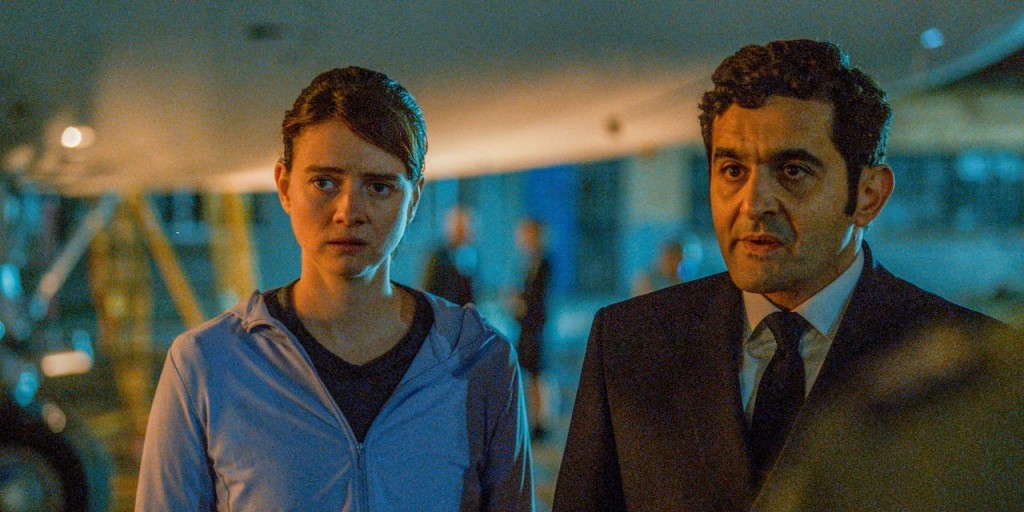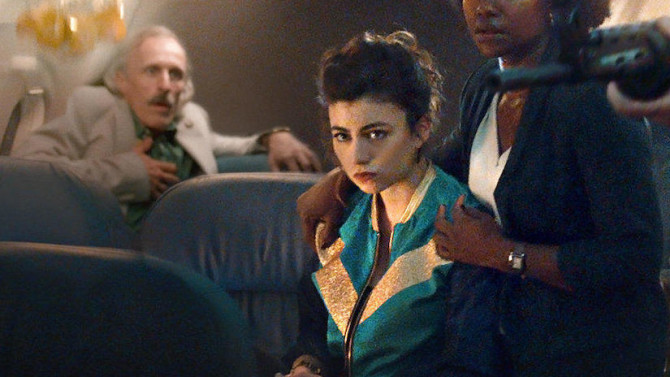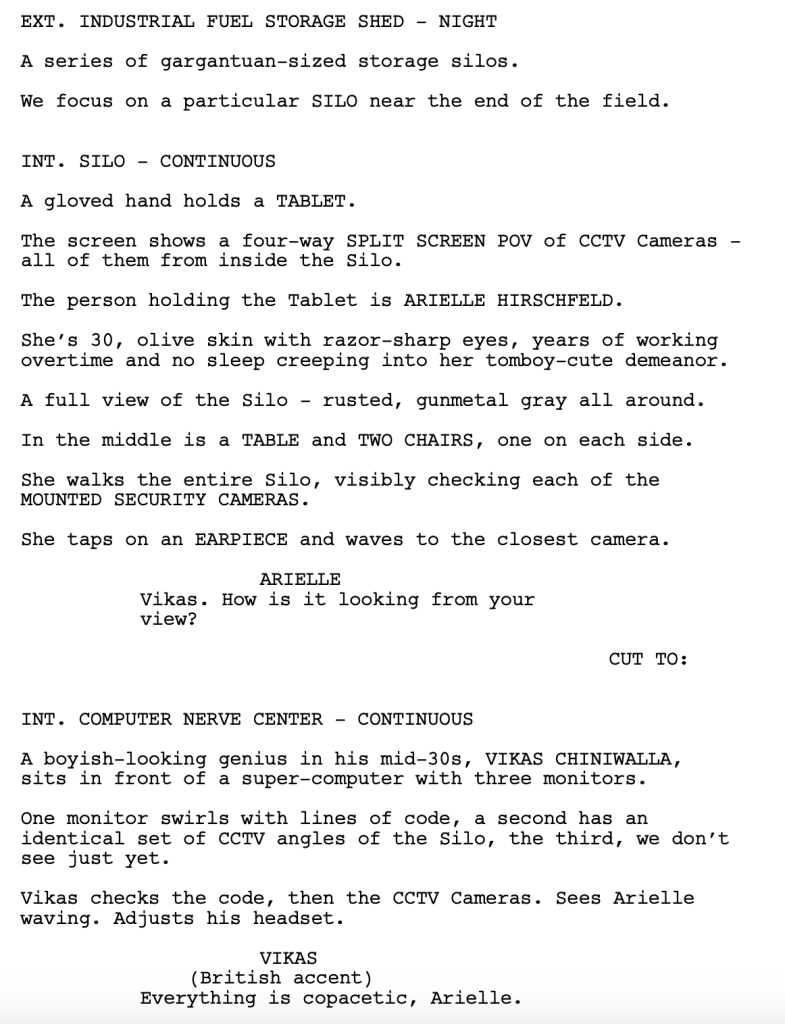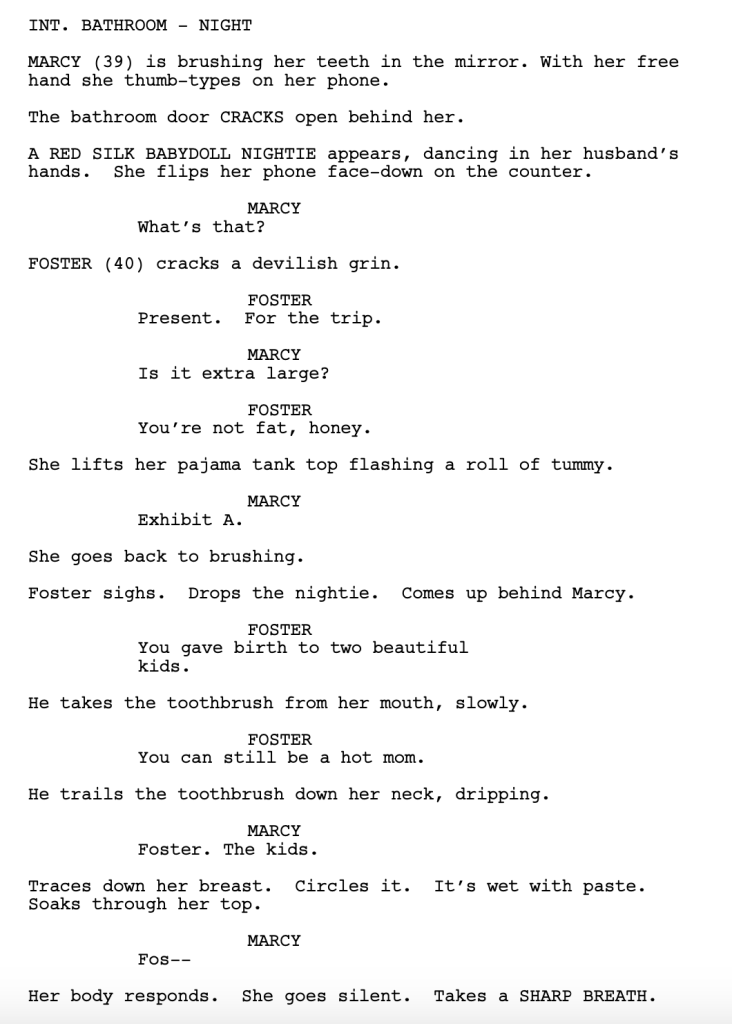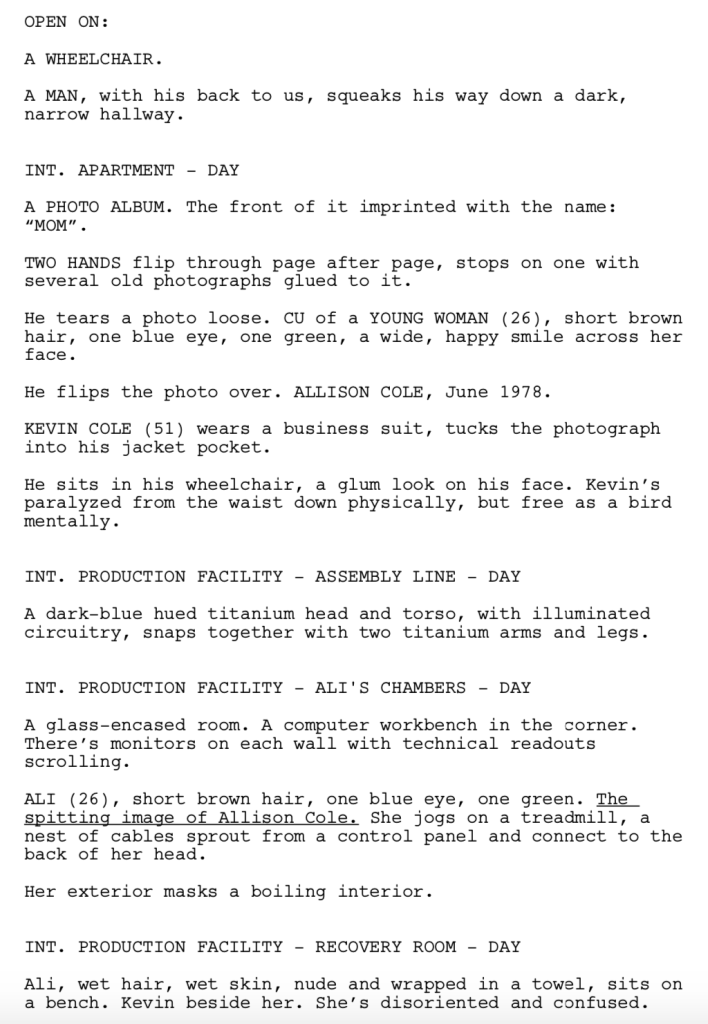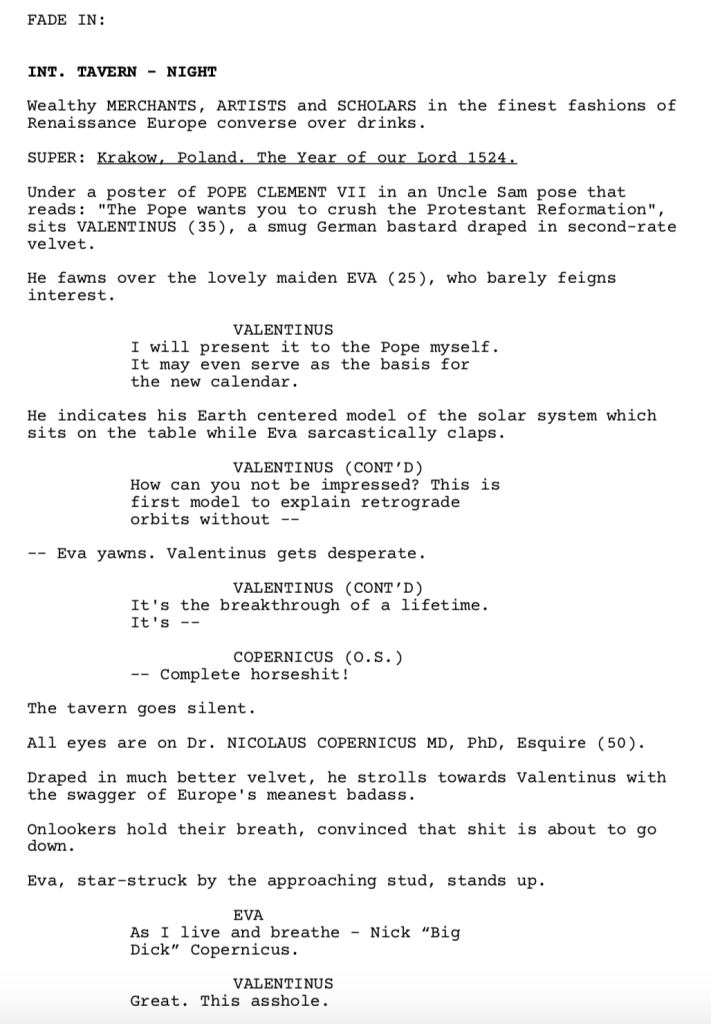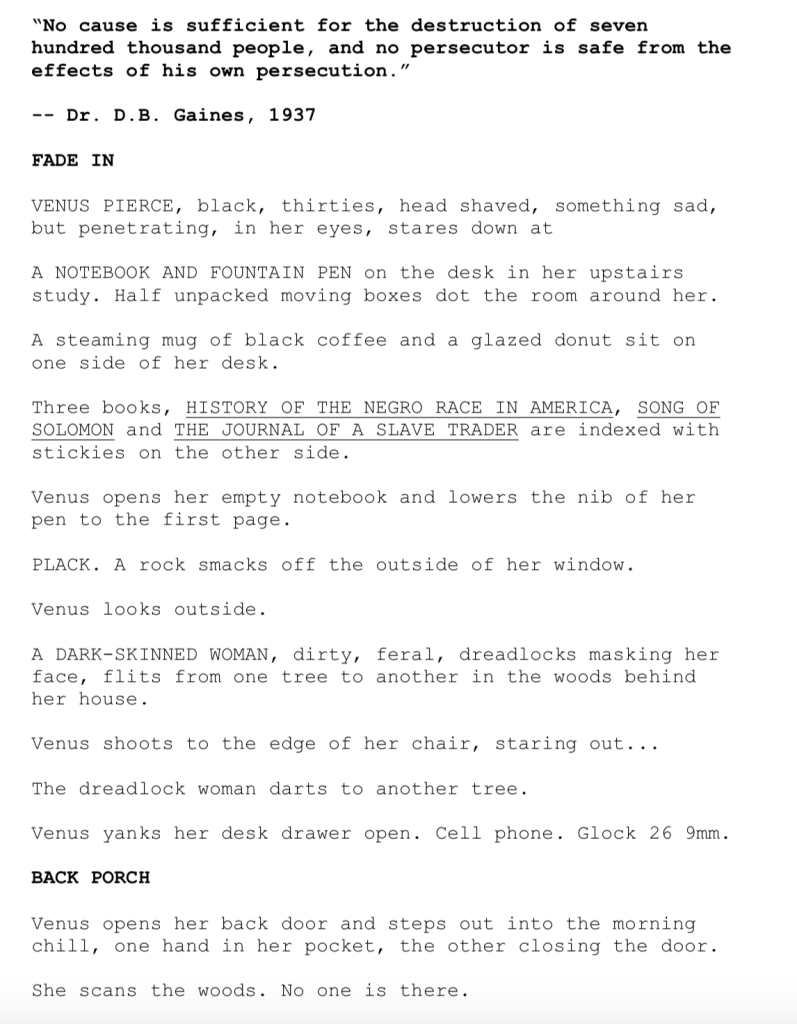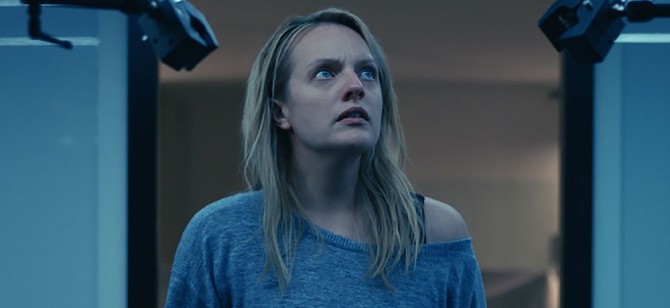Search Results for: F word
So I finished Netflix’s Into the Night and I can honestly say it’s the best TV show of the year so far.
I haven’t encountered a show with this level of urgency in a long time. The closest I can think of is Netflix’s Black Summer. But what makes Into the Night so much better is that the urgency is organically built into the premise. They have to keep flying to avoid daylight.
There are three screenwriting tips I want to bring up in particular with this show. It should go without saying that I’m including spoilers. Watch the show first if possible. I guarantee that once you start, you won’t be able to stop.
Oh, and fun little piece of trivia. This show is based on a book. And the creator adapted the entire first season from the FIRST PAGE of the book.
The first concept I want to talk about is called sandwiching.
There comes multiple times in every TV or Feature script (but TV especially) where you’ve got to write a scene with boring exposition or two characters who don’t have a lot going on. This could be the C-story in a TV episode. You’ve been told you have to write the scene and there’s nothing interesting going on between the two characters.
In these situations, you want to SANDWICH the scene with something really big before and PROMISE something big is going to happen after. If you do this well, we’ll tolerate the scene.
So there’s this moment in episode 5 of Into the Night where Sylvie, our helicopter pilot protagonist, goes back to the apartment of her dead boyfriend and mourns. Another character shows up to try and convince her to come back.
Now before this scene, we just showed a major fight between two characters in another location where one character beats the other one to near death. He then leaves that character to get back to the plane. That’s the first piece of bread on this sandwich.
The second piece is we have to leave within an hour! That’s when the sun comes up. So we have to get back to the freaking airplane NOW! This is our exciting second piece of bread which is a PROMISE that something interesting is coming. And it’s for that reason we tolerate this slow decent-but-mostly-boring scene of Sylvie trying to get over her dead boyfriend.
Where writers get into trouble is when they get lazy, when they stop sandwiching boring scenes, when they try to pile 3 or 4 boring scenes inside a sandwich, or when they don’t understand the technique at all. Because that’s when you’re at risk of writing 20-30 pages of boring story.
In an ideal world, every scene would be riveting. But it’s just not possible. You need to set certain things up for later scenarios to be exciting. And setup can be boring.
Moving on, tip 2. Dialogue doesn’t matter as much as you think it does. Into the Night is one of the most riveting TV shows I’ve ever seen. But it’s in another language. And I don’t understand that language.
Therefore, I have to use subtitles. Now, for those who don’t know about the job of subtitling, these people do not directly translate what the characters are saying. Instead, they give the bare bones generalized idea of what they’re saying in its most basic form.
If you want to have some fun, turn on the dubbed English audio and also put on English subtitles. You’ll see that their dubbed words don’t even match the subtitles. That’s because two different people are doing those jobs and they’re both just putting up their generic interpretation of what’s being said.
I bring this up because everybody talks about the importance of dialogue when shows like Into the Night and movies like Parasite are amazing yet we’re basically watching them with 3rd grade level English dialogue translation.
Does this mean you shouldn’t strive to write great dialogue? Of course not. But it’s a reminder that it’s what’s SURROUNDING the dialogue that’s most important. If you get that right, a scene will work regardless of how basic the dialogue is. Shows like Into the Night prove that.
Add conflict. Add tension. Add dramatic irony. Come up with an interesting scenario, like 7 passengers questioning an 8th passenger on if he’s really who he says he is.
From there, do the best you can with your dialogue. But it’s setting up the situation surrounding the dialogue that matters most.
Finally, one of the writing devices I like the best is when the writer makes it seem TRULY IMPOSSIBLE that the characters are going to succeed in the end.
And I stress “truly” for a reason. Because most writers set up an ending where they’re already thinking of how they’re going to get the characters around the obstacles in their way, and therefore, it doesn’t TRULY feel impossible. We can sense the writer carving that escape hatch that the characters are going to find and be okay.
Instead, you want to write your ending almost like you hate yourself. You want to make it as hard as possible for you the writer to figure out how your characters are going to get out of this.
Into the Night aces this test and then some.
(Major Spoilers)
While on their final flight – they’re not going to have fuel after this – the group has located an old Soviet bunker in Bulgaria that government officials are fleeing to. So their plan is to land the plane at the Bulgarian airport and haul ass to the bunker.
Now get this.
There’s no guarantee they’re going to get inside. It might be locked. It might be full. So right from the start, it’s bad news.
Next, they don’t know exactly where the bunker is. They’re working with some janky old map.
When they land, they have half an hour until sunrise. So they have to find a mystery bunker that they only vaguely know the location of in a country they’ve never been to before, driving on roads that are completely foreign to them, and then hope they get inside when they get there.
Only one person can carry the map but there are 9 people so they have to split up into two jeeps. So the first jeep is speeding away. The second jeep has to try and keep up with them on these winding roads. If they lose them, there’s no way to know which way to go.
Three quarters of the way there, the second jeep crashes. So they have to walk the rest of the way. Meanwhile, the first jeep crosses a gate that automatically closes behind them, locking the second group out.
The second group eventually gets to the gate but it’s electric, so they can’t even climb over it. There’s only 12 minutes left before the sun rises, by the way. They don’t even know if they’re close to the bunker or not. Also, nobody knows where the bunker entrance is. It’s not like a McDonald’s with Golden Arches signaling the location. It’s metal doors built into a hill.
I was sitting there watching this both in awe of the show, in how well it was crafted, and in awe of the writer, who so boldly made things difficult for himself.
Because it would’ve been easy to throw one mildly difficult obstacle at the characters. To throw THIS many obstacles requires a lot more work. Because now you’re stopping the characters more. You’re having to come up with solutions to these problems you’ve created. And bad writers don’t want to do that. It takes way longer to write the obstacle overcoming scenes and requires a lot more brainpower.
So I was rooting for both the characters and the writers simultaneously with this ending because I couldn’t have asked for a better end to this season.
Those are my Into the Night tips. Take them with you, into the night, and use them on your next screenplay!
The other day, I started reading a Black List script and I was about ten pages into it and it was just boring with a capital B. Since I planned on reviewing a script that day, I had a choice to make. I could either ditch this script and start a new one (which I hate to do) or I could keep going.
So I went and checked the Black List to see if I could glean any extra information about the writer. I noticed he was repped by a manager I’d never heard of before. The script was a lowly ranked Black List script. So I made the decision that, based on the first 10 pages being boring and the writer having weak representation, I was out.
Now you may say, Carson, dude, that’s savage. Are you saying that every writer who is repped by a low-level manager sucks? Writers have to start somewhere. True. Of course there are going to be good writers who start with low-level managers or agents. But, based on the 8000 screenplays I’ve read, the data has told me that, WAY more often than not, if you’re repped by someone I’ve never heard of before, it’s likely the script will be weak.
That led me to some deeper analysis about reading in general and why I choose to give up on a script. Because every reader, whether it be the lowest reader on the food chain or JJ Abrams who’s looking for his next project, have some similar judgment process by which they’ll give a script a certain amount of time. And that time will coincide with a number of factors attached to the script.
That’s what I want to talk about today. I call it SCREENPLAY CURRENCY. It’s something I’ve been attaching to scripts unconsciously for years. But today I decided to solidify it into something more tangible so that writers can understand what’s going on the reader’s head and they can properly game plan how they write a script under those circumstances.
Now to those of you who have always poo-pooed this practice of readers giving up on an amateur script but giving pros preferential treatment and reading their scripts differently, I point all of you to Amateur Showdown. We’ve proven again and again that this is not a practice unique to the Hollywood guard. Every single person who reads something is gauging whether it’s worth their time to keep reading. And, as we’ve shown over and over again, most of you don’t make it past the first page of an Amateur Showdown script. So why would you expect someone working at a production company whose time each day is limited to act any differently?
What I do with screenplay currency is I assess a number to a script based on factors surrounding that script. These numbers represent, roughly, how many pages I’m going to give the script to pull me in. So if something gives a script +3 currency, I’ll give it 3 pages. If there are several factors adding currency, a +4, a +1, and a +10, I’ll give that script 15 pages.
Again, none of this is exact. I’m not a robot who finishes at exactly page 15 and then says, “Beep-beep-boooop. Carson, what shall you do? Do you like script, press ‘yes’ or ‘no.” But I’ve found that, over time, it’s roughly accurate. That combined number is usually how many pages of my undivided attention I’ll give the script. If it’s lame or boring or sucks after that time, why would I keep reading? Why would you?
Here is an incomplete list of some of the things that create my screenplay currency:
Script is recommended to me by an impartial party (not the writer): +5
Script is recommended to me by two different people who don’t know each other: +15
Script is recommended to me by 3 or more people who don’t know each other: +25
Script is recommended to me by someone I really trust and whose taste I respect: +30
Script is ranked high on the Black List (top 5): +50
Script is ranked low on the Black List (bottom 20): +10
Script is repped by a high level agency (WME, CAA): +7
Script is repped by a high level management company (Kaplan/Perrone, Anonymous Content): +5
The writer has professional credits: +7
The writer has written at least one movie I like: +25
The script has won a high level contest (Nicholl): +15
The script has been a finalist in a high level contest (Nicholl): +10
Semi-finalist at Nicholl: +3
A top level writer in the industry (Sorkin) or a writer I really love: +100 (I’ll almost always read the entire thing)
A random script from an amateur writer who I don’t know from Adam: +1
The obvious question then becomes, what if you don’t have any screenplay currency? Should you give up?
Of course not.
But zero screenplay currency does mean you have to write differently than someone with a lot of currency. If you’re a writer who has 30 points of screenplay currency, you know you can take your time in the early scenes because you know the reader is going to stay with you.
But if you try to slow-burn your way through the first act with zero screenplay currency, you’re sinking your own ship. Readers have no reason to trust that trudging through that slow first act is going to pay off for them.
For that reason, you should be writing something that’s tighter, that’s faster, that has a flashier concept, something where you get the reader hooked right away. The perfect example of this is the script I reviewed Tuesday, Unhinged. The opening scene has our antagonist killing someone and then we’re, literally, off to the races.
Or if you don’t like car chase movies, another script that would’ve worked with zero screenplay currency is The Cabin at the End of the World. It starts off with this scary giant of a man approaching a small girl and we’re not sure if he’s going to kill her or not. First page, first scene, I’m in. And then we KEEP GOING. These guys break into this house, they tell our protagonists they have to sacrifice a member of their family and, heck yeah, I’m going to keep reading.
Conversely, if you have zero currency and you’re trying to write a script like BLUR, a drama about a group of depressed 20-somethings mucking around in life, I’m not saying it’s impossible to write something like that that gets you into the industry. But you’re stacking the odds against yourself.
The irony of all this is that the most successful screenwriters – the Sorkins, the Tarantinos, the Coens – they know they have all the screenplay currency in the world. An unlimited supply! Yet they still write LIKE THEY HAVE NONE. That’s why it’s a good mindset to have, that you have zero currency with anybody. Because when you know you have to hook a reader right away, you’re going to write more exciting stories. You just are.
So go forward with this knowledge and hopefully it will make you think twice about that next script you’re going to write.
Carson does feature screenplay consultations, TV Pilot Consultations, and logline consultations. Logline consultations go for $25 a piece or $40 for unlimited tweaking. You get a 1-10 rating, a 200-word evaluation, and a rewrite of the logline. They’re extremely popular so if you haven’t tried one out yet, I encourage you to give it a shot. If you’re interested in any consultation package, e-mail Carsonreeves1@gmail.com with the subject line: CONSULTATION. Don’t start writing a script or sending a script out blind. Let Scriptshadow help you get it in shape first!
Where screenwriters rise from the ashes to prove once and for all, the voters got it wrong!
I know. A lot of you are angrily checking your e-mail, confused about the lack of a Scriptshadow Newsletter inside when I promised you it was coming at the beginning of the week. What’s going on, Carson!!? Hey, I’m right with you. I want that newsletter to show up, too. The problem is this week has been bumpy and I haven’t had the time to get it written. These things are 10,000 words long so they’re not easy. And maybe it’s good that it’s delayed. The trades are posting about a new script sale every day. Where are all these sales coming from? Maybe it has something to do with the coronavirus and the need for material? It’s 1996 all over again.
But hopefully, this will tide you over. Everyone deserves a second chance to make a first impression. So today we’re going to pit scripts against each other that barely lost out in their respective Amateur Showdowns. I’m hopeful that we’re going to find an undiscovered gem because when I went back and looked at all of these loglines, I thought to myself, “Man, these all sound like good movies.” So now I leave it up to you to find the best of the second best.
For those new to the site, Amateur Showdown is an occasional tournament I hold on the site where I pick five screenplays that were submitted to me. Then you, the readers of the site, read as much of each script as possible and vote for your favorite in the comments section. Voting closes Sunday 11:59pm California time. The winner will receive a review the following Friday that could result in props from your peers, representation, a spot on one of the big end-of-the-year screenwriting lists, a partnership with yours truly, and in rare cases, a SALE!
I am taking submissions for the next Amateur Showdown, which will take place between 4-6 weeks from now. So get your entries in. E-mail me at carsonreeves3@gmail.com. Include your script title, the genre, a logline, and a pitch to myself and potential readers why you believe your script deserves a shot. It could be long, short, passionate, to-the-point. Whatever you think will convince someone your script is worth opening, make your case. Just like Hollywood, the Scriptshadow readers are a fickle bunch. So be convincing.
Good luck everyone!
Title: Emergent (new draft)
Genre: Sci-fi/Thriller/Romance
Logline: A brilliant programmer gets embroiled in a bizarre and dangerous love triangle between a co-worker that saved her life and an artificial intelligence that nearly killed her.
Why You Should Read: Emergent had a good contest run last year, placing as a Quarterfinalist or above in Nicholl, Page, Austin, and Big Break as well as a few others. It landed me a few queries and even a couple meetings with managers, but no bites on it yet. I’ve since made some revisions (based on feedback from said meetings, etc.) and will be sending it out again this year. I’d really love to hear the opinions/advice/feedback from the scriptshadow community and even get it reviewed. Cheers.
Title: The Fire Tower
Genre: Contained Thriller
Logline: When a family on vacation to a remote fire lookout tower rescues an injured female hitchhiker, they wind up in a battle for their lives.
Why You Should Read: When I was 10, we went on a cross-country camping trip out west. One night we got horribly lost on a winding road, high in the mountains. Out of the darkness a hitchhiker jumped in front of our car asking for a lift. We gave her some water and snacks (but my mom wouldn’t let my dad give her a ride). Later, I was told that a whole family had disappeared without a trace not far from there. That was the seed of the story. But I needed a contained space to trap my family.
Lookout towers have been used in the United States for 100 years. At the peak of their popularity in the ‘40s, the U.S. had about 8,000. Today, there remain about 85 fire lookout towers in the U.S. in extremely remote mountain areas in the National Forests which you can rent for $25-$75 a night.
Title: Kamikaze
Genre: Action
Logline: After her creator is killed in a terrorist attack, an emotionally charged android, suffering from a fatal virus, struggles to hunt down the mercenaries responsible.
Why You Should Read: Kamikaze is a non-stop, can’t catch your breath action script. It’s placed very well in screenwriting competitions (finalist), it nabbed me a manager (we’ve since parted), but the script hasn’t gotten much traction. I’m really wanting to know if there’s something I’m missing, and if I genuinely have what it takes to make it. — The main character, Ali, in an android that can’t seem to keep her emotions in check, which is a major drawback to those that created her. The script plays with the concept of logic vs. emotion and how they can help/hinder in various situations. — Thank you for the opportunity to give it a read.
Title: Renaissance Men
Genre: Action, Comedy
Logline: In 16th-century Rome, astronomical badass Nicolaus Copernicus seeks papal approval for his radical new theory about the universe, but after he’s framed for the Pope’s kidnapping, he’ll risk his life and legacy to track down the real abductors.
Why You Should Read: I’ve always loved history. I just wish it could be funnier. If I had a time machine, I probably wouldn’t use it kill baby Hitler. Instead, I’d just swap him with baby Charlie Chaplin who was born a mere four days earlier. But since the latest version of Final Draft is easier to get my hands on than a functioning time machine, I decided to write Renaissance Men. A hilarious adventure that pits some of Renaissance Europe’s biggest egos including Copernicus, Machiavelli, Nostradamus and Michelangelo against each other in a high stakes game of cat and mouse.
I had many reasons why I wanted to write this. First, I knew it would be a lot of fun. Second, I was sure I could generate a ton of laughs. And last but not least, because a story about how the rich and powerful will cover up scientific truth to protect their political interests is even more relevant today than it was 500 years ago.
Title: THE BLACK PETREL
Genre: Horror/Thriller
Logline: A frustrated novelist goes to an old Southern hotel looking for inspiration and finds herself trapped in a nightmare with five strangers and a vengeful ex-slave.
Who am I: A writer trying to feed a hungry audience something delicious.
Why You Should Read: If GET OUT and A NIGHTMARE ON ELM STREET got pregnant listening to a Nina Simone song, this is the baby that would pop out.
This week I talked to not one, not two, but THREE separate writers who were all having the same problem. They were having trouble coming up with a movie idea to write. Movie ideas are probably the most debated aspect of the screenwriting process. Everyone knows when they see a good one. And yet coming up with your own good movie idea remains the most challenging part of the process.
That’s because we don’t judge our ideas the way we judge others. We judge other ideas with objectivity. If it sounds good, we give it the thumbs up. But we create our own ideas out of emotion. There’s an element within the idea – the main character, the subject matter, the theme – that resonates with us on a deeper level. And that’s the problem. That resonance creates rose-tinted glass we see our idea through.
Emotion is not a bad thing, of course. You want emotion when you’re writing a screenplay. But it does get in the way of conceptualizing your idea. You can be so laser-focused on how you’re going to express this element that you can’t see the rest of the idea for what it really is – confusing, or generic, or maybe plain boring. Which is why you always want feedback on your ideas.
But today I want to make the process a little easier for you. What I’m going to do is give you the ten best ways to generate a movie idea. All of these are legitimate approaches to coming up with a good idea. I’m going to start with the worst of these options and move my way up to the best option. Let’s jump into it.
10) Horror and Guns – If you’re really struggling to come up with an idea, write a horror movie or a Guy/Gal with a Gun movie that contains ONE ELEMENT WE HAVEN’T SEEN BEFORE. Like a horror movie where you can’t make a noise (A Quiet Place). These are the two most marketable genres for spec scripts. So when in doubt, write one of these. Because you’ll have the best chance at actually selling them.
9) Follow Your Heart – This is that idea that won’t go away. It’s been sitting in your head for years. It may not be an objectively good idea. HOWEVER. Passion plays a large part in writing a great screenplay. The more passionate you are about something, the more likely you’ll go the extra mile to make it great. So the idea is that you’ll make up for the lack of a big hook by writing something emotionally earth-shattering. That’s how Titanic was written. That’s how Get Out was written. You have to accept that, when you’re finished, you’ll get less script requests. But, hopefully, the people who do request it will be more likely to enjoy it.
8) Update It – If you straight up suck at coming up with ideas, this is a good option. Go back 10, 20, 30 years ago and look for movie types that were popular then. If they were popular once, Hollywood believes they can be popular again. So just bring that genre back with a little modern update if possible. For example, romantic thrillers like Basic Instinct and Fatal Attraction were big in the late 80s. Goofy horror movies like Scream and I Know What You Did Last Summer were big in the 2000s. It doesn’t take a lot imagination to update these genres so it’s an easy way to come up with a marketable concept.
7) Ripped From The Headlines – This is another option for those of you who struggle to come up with your own ideas. Take a hotly debated issue that’s out there in the headlines and build a GENRE movie around it. That last part is key. If you try and build an on-the-nose drama about the issue, we’re going to roll our eyes. Express the execution through a marketable genre. Invisible Man (horror) was about toxic masculinity. Get Out (horror-thriller) was about racism. The Hunt (thriller/satire) was about the political divide. Don’t Worry Darling (Thriller/Sci-Fi) is about toxic masculinity. Right now, this is a great formula for coming up with a sale-able spec.
6) Twist and Shout – Look through all of the time tested movie types out there and see if you can find a way to twist them. So, for example, the buddy cop sub-genre. One of the most reliable formats in movies. “Bright” takes that format and changes one of the parties into an ogre. It was enough to result in a huge spec sale and Netflix’s most watched movie to date. A bigger example would be “It.” A time-tested formula – a young group of friends coming of age during the summer – set in the horror genre.
5) Fascinating True Stories – Find a true story that sounds good and let it do all the work for you. Some writer found a story about JFK saving a dozen people when his boat capsized during World War 2. These days googling, “Great War stories” could find you hundreds of big screen worthy stories that haven’t been told yet. What are you waiting for?
4) An Underdog Story – Underdogs are the most beloved characters in movies. In a medium where writers struggle to come up with heroes audiences give a s@#$ about, underdogs are a cheat code. Forrest Gump. Rocky. Slumdog Millionare. Luke Skywalker. Deadpool. The Mule. The Social Network. Come up with an underdog at the heart of your story and I promise you, your script will be one of the easiest reads of the year.
3) Irony – A good ironic premise instantly separates itself from the pack. Here’s what I wrote in a previous article: “The most basic form of movie irony is to make your hero the opposite of what’s required of him. So you wouldn’t write a story about an atheist who starts his own atheism support group. You’d write a story about an atheist who takes a job as a Christian preacher to make ends meet.” Here’s a whole post about ironic premises.
2) A Fascinating Main Character – This is for writers who are bad at coming up with plots. If your mind doesn’t think that way, do not fear. Instead, come up with a really interesting character then build the bones of the plot around them. Take a look at Arthur Dent (Joker) or Louis Bloom (Nightcrawler) or Max Fischer (Rushmore). In all three of these movies, I’m betting the writers came up with the character first and then formulated the plot pieces around them. The reason you can get away with writing a script that doesn’t have a big plot hook is because everything in this business still comes down to getting bankable actors on board. So if you’re a reader and you see a logline with a really interesting main character, you know if the script turns out to be good you could get a lot of actors interested.
1) High Concept – The biggest, the flashiest, the cleverest, ideas still always win. This is a NUMBERS GAME. That means a certain number of people need to read your script before someone says yes. Therefore, it is in your interest to come up with ideas that get the most people interested in reading your script. The best way to do this is still the high concept idea. How do you come up with a high concept? The best model I know of is the “strange attractor” approach. You must have that thing in your concept that sounds both big and unlike something we’ve seen before. It’s the thing that makes your idea different from everyone else’s. The good news is you can come up with high concept ideas for big movies (The Meg – A group of scientists exploring the Marianas Trench encounter the largest marine predator that has ever existed – the Megalodon shark), medium-sized movies (Split – Three girls are kidnapped by a man with a diagnosed 23 distinct personalities), and small movies (Saw – Two men wake up in a small room chained to the wall with a saw in between them). So you don’t have any excuses. Still the king of the concept creation pack in my opinion.
One of the problems I see writers make is they try to come up with movie ideas out of nothing. They sit at their computer and try to will a good idea into existence. That kind of thing can work under certain conditions. That’s how Bruckheimer and Don Simpson used to come up with ideas. They’d read through the day’s newspapers and magazines until they found a good idea. But that’s generally not how the best ideas emerge. The best ideas come through organic inspiration. You’re out and you see something interesting and your mind goes into, what if that was a movie? You write the idea down and you don’t go back to it. If that idea is still nudging at you three months later, chances are it’s a good idea. Coming up with a good movie idea will always be hard but hopefully this list makes the process a little easier.
Carson does feature screenplay consultations, TV Pilot Consultations, and logline consultations. Logline consultations go for $25 a piece or $40 for unlimited tweaking. You get a 1-10 rating, a 200-word evaluation, and a rewrite of the logline. They’re extremely popular so if you haven’t tried one out yet, I encourage you to give it a shot. If you’re interested in any consultation package, e-mail Carsonreeves1@gmail.com with the subject line: CONSULTATION. Don’t start writing a script or sending a script out blind. Let Scriptshadow help you get it in shape first!
Genre: Romantic Comedy
Premise: After Georgia accidentally receives an out of the blue invitation to her on-again, off-again boyfriend’s wedding, she and her best friend Keely make the ill-informed decision to attend.
About: This script finished with 8 votes on last year’s Black List. It’s Carrie Solomon’s breakthrough screenplay.
Writer: Carrie Solomon
Details: 117 pages
The nice thing about reading screenplays is that you can cater the day’s read to whatever mood you’re in. Today, I needed a pick-me-up so I decided to read a comedy. Now if there’s one thing I’ve learned about comedies, it’s that if you don’t laugh on the first page, there’s a good chance you won’t be laughing at all.
I started with a script called “Dude Ranch,” which had a premise I didn’t understand. When his ex-wife starts dating another guy, our hero follows him to something called the “Dude Ranch” where you compete in manly activities, except they’re the woke version of manly activities. On top of this, the first ten pages were all about religion. So I had no idea what was going on. And I didn’t laugh once in ten pages.
I then moved to a Black List script called, “Assisted Living.” Here’s the logline on that one: “When a thief on the run needs to go into hiding, disguised as an 81 year old, she checks into a retirement community shared by her estranged grandmother.” Not the worst idea. And the first page did make me laugh. A young girl is helping her mom steal something by distracting the store owners, pretending to be a lost French girl looking for her parents. She doesn’t actually know French. She’s just throwing out a bunch of random French words together. It’s working until a guard walks over who speaks fluent French.
So I said, okay, we might have something there. But we follow that up with that same girl, now 35 years old, going to a club, noticing a bunch of bitchy 20-something girls making fun of her age, so she goes out on the dance floor and twerks like a maniac to prove she’s still got it. All I could think was, “What does this have to do with the premise?” Talk about random. So I x’d out of that after 15 pages.
That led me to this script, My Boyfriend’s Wedding. The first scene, which had our heroines out clubbing, begging for the defiant DJ to play “Alone” by Heart didn’t make me laugh. But it did make me smile. And I liked the banter between the friends and the DJ. I was getting tired of opening new scripts so I said, screw it, I’m in.
30 year old Georgia is a commitment-phobe. She has this great guy named Adam she’s known since high school who routinely flies out to visit her from Atlanta, and every time they’re together he asks her to become his committed girlfriend. But every time, Georgia resists.
So one day Georgia and her best friend Keely are hanging out and they receive an invitation from Adam’s parents… TO HIS WEDDING! What??? Georgia is confused. This man has spent the last three years proclaiming his love for her. They just had sex a few weeks ago. He’s getting married?? What’s going on???
Determined to straighten this out, Georgia accepts the invitation and makes Keely her plus-one. They fly to Atlanta where Georgia makes a bee-line to Adam at the pre-wedding party. Adam apologizes. He admits he’s been dating his fiance, Missy, for a couple of years. He’s only ever wanted to be with Georgia but since she wouldn’t commit, he decided to finally tie the knot.
Meanwhile, Keely bumps into Missy and the two start a friendship that quickly becomes sexual. When Georgia and Keely reconvene, Keely doesn’t tell Georgia she’s now sleeping with the bride. Georgia then loses control and sleeps with Adam again. It’s a wedding catastrophe!
Keely is determined to break up the wedding because Missy is such a great person and she shouldn’t be marrying a man who’s secretly in love with another woman. Georgia eventually becomes convinced that Adam is selfish and he wanted to keep two girls on the line and tells him as much.
Georgia and Keely then head home where the movie decides to explore their broken friendship for the third act. I guess the movie was about their friendship all along? Maybe? I don’t know. I had a hard time figuring this one out.
“My Boyfriend’s Wedding” needed to nail down the screenwriting basics better. Character, structure and theme.
For starters, nobody’s sympathetic here. Every time Adam has professed his love for Georgia, she blows him off. So we don’t like her. It turns out Adam has been hiding this whole other girlfriend from Georgia. So we don’t like him. Missy moves in on Keely, so we don’t like her. And Keely is straight up annoying. So we don’t like her.
Who are we rooting for here?
I prefer you have more than one sympathetic character in your script. But at the very least, your hero needs to be sympathetic. Everybody else do whatever you want with them as long as they’re funny. But Georgia has to be sympathetic. And she isn’t. We’re not even sure why she’s mad at Adam. She friend-zones him whenever he tries to make her his girlfriend so why is she getting all angry that he has someone else?
You may have been able to get away with this if Adam was a HUUUUUGE a-hole. Like he was super-manipulative and is banging three other women on the side. Sometimes you don’t need a sympathetic hero if the audience is obsessed with taking the villain down. But Adam and Georgia are high-school sweethearts. So it’s odd. We’re not sure if we’re supposed to hate the guy or like him, root for them to get together or stay apart.
If the audience isn’t sure what they’re supposed to root for, you don’t have a story.
The structure was odd as well. It’s a movie titled My Boyfriend’s Wedding yet the final act takes place after the wedding in another city. Not only that, but the movie becomes about Georgia and Keely becoming friends again after their wedding fallout. That would be okay if you’d established that there was a deep-rooted problem in their friendship through the first two acts. But they were fine in the first two acts. They disagreed on a few things but were otherwise great.
Your third act is the act that needs to resolve all of the things you’ve set up in the first two acts, both in the plot and with the characters. So for you to all of a sudden say, “Oh, this is about friends now,” is jarring.
The characters also had motivation issues. You establish in the first scene that your hero doesn’t like someone. Adam tells Georgia he loves her and she tells him she’s not interested. So why would that person care about breaking up his wedding?
This is what a lot of comedy writers don’t understand. They only focus on the jokes. But if the fundamentals don’t make sense, the jokes won’t land. You have to set everything up so that we go into each scene understanding where each character is coming from. That’s why we laugh. When we see their plans get screwed up and turned around.
Take Bridesmaids, for example. Look at how clearly they set up the main dynamic. Kristin Wiig’s character is jealous that this other woman has become best friends with her best friend. So in every one of their scenes, she’s trying to out do her. Like the toast scene. She will not be topped. She has to keep going and giving a better toast. The motivations in My Boyfriend’s Wedding were never clear and therefore we weren’t sure when we were supposed to laugh.
I guess the argument for this as a script is that it’s a romantic comedy that takes a look at female friendship. We don’t see a lot of those. But if that’s what this movie is going to be, there needs to be a lot more focus placed on the friendship. You can’t throw all that in at the last second. It’s thematically inconsistent.
Unfortunately, I couldn’t get into this one. What did you guys think?
[ ] What the hell did I just read?
[x] wasn’t for me
[ ] worth the read
[ ] impressive
[ ] genius
What I learned: In comedies, you need to define who it is we’re rooting for to win and who it is we’re rooting for to lose. In other genres, you can play around more in the gray. But even then, I advise you give us clear good guys and bad guys. If it’s muddy, like it is here, it leaves the audience unsatisfied. They’re not really sure who won and who lost.

